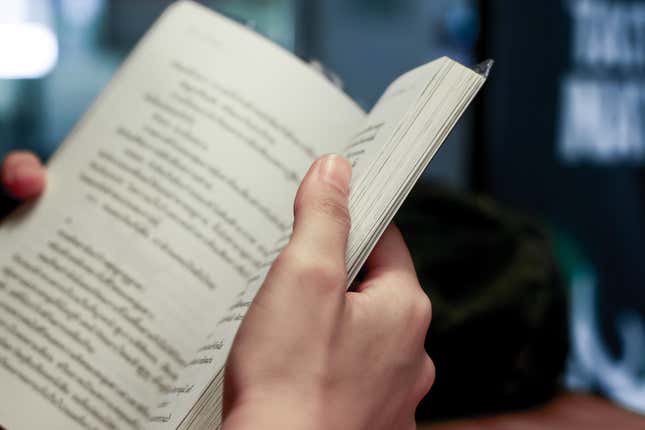
Politics are weird AF. For instance, the Virginia governor’s race—one I happen to be witnessing (via force) from a front-row seat in Washington, D.C.—has reached extinction-level event levels of mudslinging. Glenn Youngkin, the Republican nominee whose ads make me hate him as a person, and Terry McAuliffe, the Democratic candidate whose ads also make me hate him, are locked in a relative dead heat to take Virginia’s executive mansion. What this means is that their campaign ads have teetered into pure foolywang.
Enter Toni Morrison and her Pulitzer Prize-winning, multiple-other-awards- winning and New York Times GOAT-labeled book, Beloved. Though...not by name.
You have to do some work to understand what’s happening here since it’s vague as fuck. You see, Laura Murphy (featured in the ad) is a mother whose son, Blake, was assigned the book Beloved in his high school AP English class and though he didn’t finish the book, it gave him nightmares, causing his mother to go all activist on the school system and demand the ability for parents to have some say so in what their kids are reading in school—an idea I don’t altogether disagree with, for the record. More on that later.
Beloved, though, is a book about slavery, and, much like slavery, the imagery isn’t pretty. Bad things happen. I’m drastically oversimplifying this because it’s beside the point. I’d bet that most people who are invested in banning the book haven’t read so much as a page of it. For one, Beloved is not an easy read. I don’t know a single human who read it one time and was like, “I got it.” I don’t know if I’ve ever made it all the way through in one sitting and even then, I still find it to be one of the most difficult reads of my entire reading experience. You have to put in work and effort to truly understand it. Sure you can pull out an excerpt where traumatic and explicit things happen. But you can do that with the Bible and, well, I don’t hear anybody trying to ban the Bible.
But you know, using Beloved as a political touchpoint did make me think of other books I know I had to read that in high school that, ya know, might have been a bridge too far. If we want to get rid of books that might have some “problematic” themes then here are a few other books that might be worth examining.
1. Romeo & Juliet, William Shakespeare
Have you read this shit in years? Sex. Drugs. Murder. Suicide(s). Violence. I had nightmares, too.
2. A Separate Peace, John Knowles
I rather enjoy this book, but I mean, kids are mean, and prep school kids can be the meanest. This novel has betrayal, attempted murder (you shake a tree while I’m standing on it that means you tried to kill me, fam), jealousy, envy and up-and-down friendships. It’s like high school all over again (save for the attempted murder). How is this good reading for students?
3. Hamlet, William Shakespeare
I mean come on. How is this OK for high school? LSD trips (I mean, that’s what I’m assuming Hamlet was on, or maybe my book had different pages), ghosts, murder, suicide, fighting with parents, spies, etc. You can’t trust anybody in this story. Shit, Hamlet and his mother got into a yelling match (if you’ll remember) and that happens in white households all the time if what I’ve been told is true. But even Claudius marrying his brother’s wife right after King Hamlet dies—again, save the children, yo. Also, it’s just long as fuck. Again, save the children.
4. Lord Of The Flies, William Golding
I don’t remember a ton about this book but what I do remember is that a bunch of kids end up stuck on an island and turn basically go into Naked & Afraid mode, ultimately killing one of their own. They didn’t kill Cornbread in this joint, but they did kill Piggy. Even some 30 years later, I remember this; it stuck to my ribs and they were trying to kill Ralph. Ralph. Like Tresvant. Are there some truly important lessons in this book? I don’t remember them; I just know kids out here are killing kids and we can’t have that invading the minds of other kids.
5. Fahrenheit 451, Ray Bradbury
I loved this book. But I was also ready to burn the shit out of some books after reading it, too. And not to suppress thought, either. Just to burn shit. Like, is 451 degrees really the degree at which books catch fire? Inquiring minds would like to know. You never know how impressionable young minds might be and if we’re trying to save the kids from imagery that might harm them or the greater community, then we might need to consider holding off on letting this classic novel make it into any classrooms.

